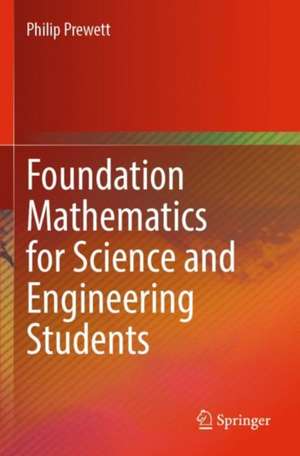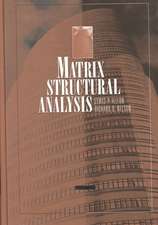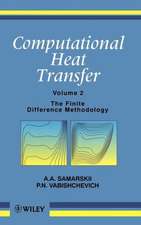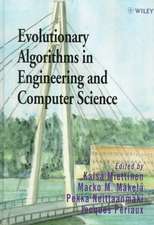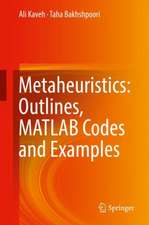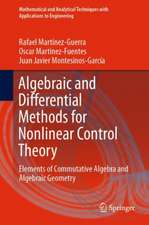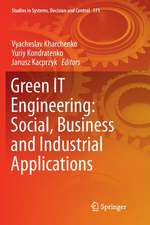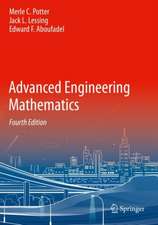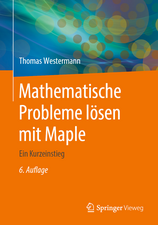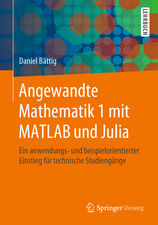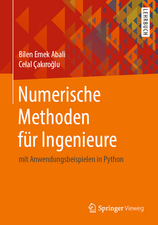Foundation Mathematics for Science and Engineering Students
Autor Philip Prewetten Limba Engleză Paperback – 6 mai 2023
| Toate formatele și edițiile | Preț | Express |
|---|---|---|
| Paperback (1) | 395.07 lei 3-5 săpt. | +13.63 lei 7-11 zile |
| Springer International Publishing – 6 mai 2023 | 395.07 lei 3-5 săpt. | +13.63 lei 7-11 zile |
| Hardback (1) | 458.26 lei 3-5 săpt. | +17.41 lei 7-11 zile |
| Springer International Publishing – 5 mai 2022 | 458.26 lei 3-5 săpt. | +17.41 lei 7-11 zile |
Preț: 395.07 lei
Nou
Puncte Express: 593
Preț estimativ în valută:
75.59€ • 78.93$ • 62.42£
75.59€ • 78.93$ • 62.42£
Carte disponibilă
Livrare economică 25 martie-08 aprilie
Livrare express 11-15 martie pentru 23.62 lei
Preluare comenzi: 021 569.72.76
Specificații
ISBN-13: 9783030919658
ISBN-10: 303091965X
Pagini: 116
Ilustrații: IX, 116 p. 47 illus., 15 illus. in color.
Dimensiuni: 155 x 235 x 17 mm
Greutate: 0.19 kg
Ediția:1st ed. 2022
Editura: Springer International Publishing
Colecția Springer
Locul publicării:Cham, Switzerland
ISBN-10: 303091965X
Pagini: 116
Ilustrații: IX, 116 p. 47 illus., 15 illus. in color.
Dimensiuni: 155 x 235 x 17 mm
Greutate: 0.19 kg
Ediția:1st ed. 2022
Editura: Springer International Publishing
Colecția Springer
Locul publicării:Cham, Switzerland
Cuprins
Trigonometry.- Real and Complex Numbers.- Vector Algebra.- Matrices.- Differentiation.
Notă biografică
Professor Philip Doughty Prewett BSc (Wales), DPhil (Oxon), CPhys, FInstP, FLSW, FRSA
Philip Prewett has been an academic, an industrial research engineer, a government scientist, and senior academic at leading UK University, having been Joint Head of the School of Mechanical Engineering at Birmingham University, where he is now Emeritus Professor, previously holding the Lucas Chair of MicroEngineering and Nanotechnology from 1998 until 2011. At Birmingham, he set up and chaired the Mathematics Working Group which overhauled the Mathematics teaching of his department, and also the Smart Working Group. His own teaching was focused on developing and delivering Engineering Mathematics courses, including a new first year Engineering Mathematics module. He also developed and taught second year Engineering Mathematics and fourth year Applied Mechanics, which was essentially an advanced applied vector mathematics module.
At University College of Wales,Swansea, Philip Prewett studied Physics, Pure Mathematics and Applied Mathematics at Part I. He was offered honours courses in all three subjects and proceeded to major in Physics, graduating with 1st class honours in 1969. He won an ASSIST postgraduate scholarship to Oxford University’s Department of Engineering Science, where he was awarded a Diploma in the Science and Applications of Electric Plasmas with Merit in 1971 and a Doctor of Philosophy (DPhil) degree in the science of electric plasmas in 1975. His doctoral thesis was a mix of experiments and applied mathematics.
He is a Fellow of the Institute of Physics, a Founder Fellow of the Institute of Nanotechnology, Fellow of the Royal Society of Arts and Fellow of the Learned Societ y of Wales. He has authored over 160 research papers, a book chapter, and a research book (Wiley 1991); he is co-inventor of four patents.
He is still research active in the field of Microengineering & Nanotechnology, where his special interests are medical breath analysis for disease diagnosis and microneedle patches for mass vaccination and blood tests.
In addition to his Emeritus Chair, Philip Prewett is Visiting Professor of Nanotechnology at the University of New South Wales Australia, Visiting Professor of Physics at the Open University, and at Technical University Wroclaw, Poland, and is a former Visiting Professor in the Physics Department at King’s College, London. He is founder and CEO of Oxford Scientific Consultants Ltd and co-founder and CEO of Oxford MicroMedical Ltd and Oxacus Ltd.
Philip Prewett has been an academic, an industrial research engineer, a government scientist, and senior academic at leading UK University, having been Joint Head of the School of Mechanical Engineering at Birmingham University, where he is now Emeritus Professor, previously holding the Lucas Chair of MicroEngineering and Nanotechnology from 1998 until 2011. At Birmingham, he set up and chaired the Mathematics Working Group which overhauled the Mathematics teaching of his department, and also the Smart Working Group. His own teaching was focused on developing and delivering Engineering Mathematics courses, including a new first year Engineering Mathematics module. He also developed and taught second year Engineering Mathematics and fourth year Applied Mechanics, which was essentially an advanced applied vector mathematics module.
At University College of Wales,Swansea, Philip Prewett studied Physics, Pure Mathematics and Applied Mathematics at Part I. He was offered honours courses in all three subjects and proceeded to major in Physics, graduating with 1st class honours in 1969. He won an ASSIST postgraduate scholarship to Oxford University’s Department of Engineering Science, where he was awarded a Diploma in the Science and Applications of Electric Plasmas with Merit in 1971 and a Doctor of Philosophy (DPhil) degree in the science of electric plasmas in 1975. His doctoral thesis was a mix of experiments and applied mathematics.
He is a Fellow of the Institute of Physics, a Founder Fellow of the Institute of Nanotechnology, Fellow of the Royal Society of Arts and Fellow of the Learned Societ y of Wales. He has authored over 160 research papers, a book chapter, and a research book (Wiley 1991); he is co-inventor of four patents.
He is still research active in the field of Microengineering & Nanotechnology, where his special interests are medical breath analysis for disease diagnosis and microneedle patches for mass vaccination and blood tests.
In addition to his Emeritus Chair, Philip Prewett is Visiting Professor of Nanotechnology at the University of New South Wales Australia, Visiting Professor of Physics at the Open University, and at Technical University Wroclaw, Poland, and is a former Visiting Professor in the Physics Department at King’s College, London. He is founder and CEO of Oxford Scientific Consultants Ltd and co-founder and CEO of Oxford MicroMedical Ltd and Oxacus Ltd.
Textul de pe ultima copertă
This compact textbook provides a foundation in mathematics for STEM students entering university. The book helps students from different disciplines and backgrounds make the transition to university. Based on the author’s teaching for many years, the book can be used as a textbook and a resource for lecturers and professors. Its accessibility is such that it is can also be used by students in their final year in school before university and help them continue their mathematical studies at college. The book is designed so that students will return to the book repeatedly as their undergraduate careers progress. Although compact and concise, it loses no rigour. All the topics are carefully explained meaningfully, not just presented as a set of rules or rote-learned procedures.
.
.
Caracteristici
Provides a compact, concise yet rigorous foundation maths for engineering and science students Is a vital textbook for the transition from school to university Covers a key resource for new STEM students disadvantaged by COVID-19
